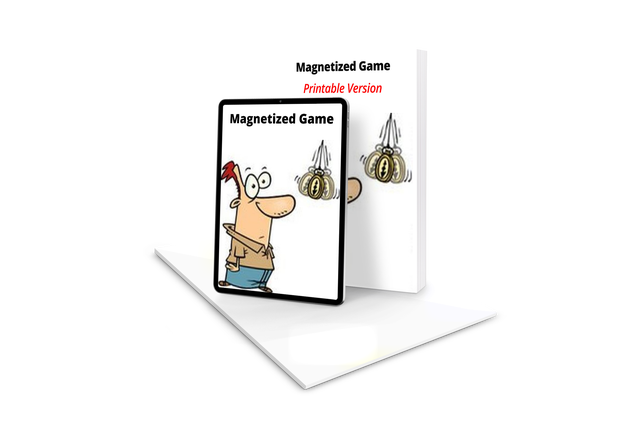Magnetized Game
SKU:
$4.99
$4.99
Unavailable
per item
This game helps people in understanding body language and identifying the team's psychological leader who influences their behaviors.
Learning through games allows your participants to acquire knowledge through practice and social interaction with the environment and peers while experimenting and developing their skills in non-threatening scenarios.
MAGNETIZED GAME
This Communication Skills game will be in a word-digital-file format, is customizable, and re-brandable based on your business requirements. Upon checkout, you will immediately receive the product in your email inbox.
Important guidelines for coaches, trainers, or facilitators on using this game in your courses:
Nice Tip: It would be great to take photographs (especially with larger groups) and email these to the whole audience in an 'It was a terrific training' email after the training is completed. These photos will leave an everlasting positive impression of your training and can also be used as a great marketing tool when shared or posted.
- Make sure games comply with general corporate culture and ethics: Ensure that all icebreakers or games activities and all corporate events comply with equality and discrimination policy and law in respect of gender, race, disability, age, etc.
- Make your trainees are the focus of your activity: Remember it is about them, not you! Forget your ego. Your success is individuals capitalizing on their personal learning. The reward of an effective facilitator is the knowledge that you offer and develop opportunities for others to learn and succeed! So you need to make an effort to know if trainees are ready, willing, and able to become personally involved in the learning process: learners have to be prepared to actively develop their understanding, criticize and evaluate the messages in their context and then work hard to apply appropriate practices in a fun and interactive learning environment.
- Adopt experiential and reflective techniques: This can be achieved by developing personal insights and understandings through involvement in intellectual, emotional, and physical activity.
- Test your game before getting started: for example find a group of people who are happy to volunteer. Make sure they feel comfortable and excited about their roles. Think about the activities you have experienced in the past. Talk to other people. Ask the potential delegates if they have ideas and preferences or recommendations to tweak the game before starting.
- Be creative when dividing people into groups: It often helps to break the group into pairs or trios. Smaller groups allow for more discussion, keep participants from mentally wandering, build rapport, and allow for one-on-one relationships. Pairs place two people in a no-threat, eye-to-eye relationship where rapport is easy to build. Trios maintain intimacy but provide more points of view. You can divide a large group into small groups by having them discuss the activity with the person behind them or beside of them, or having Quickest Guide For Interactive Games and Icebreakers 3 TRAINER'S BOX® people take a different seat when they return from breaks or activities. The idea is to get them to meet and learn about other people’s ideas not only their friend’s or favorite partner’s.
- Start post-game discussions that lead to constructive critical review and develop a thorough understanding.
- Don't pre-judge: When you are biased to your own opinions and try to impose them, this hinders your audience's development because they get distracted by your personal thoughts. Instead, allow trainees to brainstorm, challenge, and interchange ideas freely while you only play the role of an unbiased moderator.
- Build confidence and have a positive outlook toward other attitudes and behaviors: Confidence is developed through success and skills development - create behavioral change by focusing on strengths and successes, and channel this development to weaker areas.
- Be really engaged yourself, and others will follow: Avoid role-play in the conventional sense. All activities must be designed, managed, and facilitated carefully so that the activity has an impact. When this occurs, your trainees will always remember how goals were reached in such a fun and creative way.
- Use challenging thought-provoking and stimulating questions in reviews; especially for group discussions - this will help learners develop their own understanding and draw their own conclusions.
- Resist the temptation to give answers: Ask questions only: Don't tell people what they should learn. An observer is in a privileged position, often seeing aspects that are not obvious to others. If you observe a point that isn't raised during a review, it is legitimate to raise it, but only through questions. Allow participants to 'own' the discussion. Whatever happens, don't be tempted to provide a 'professional analysis' as this approach removes ownership from the individual.
- Applaud and thank participants for their contribution to the game or icebreaker at the end of each activity.
Nice Tip: It would be great to take photographs (especially with larger groups) and email these to the whole audience in an 'It was a terrific training' email after the training is completed. These photos will leave an everlasting positive impression of your training and can also be used as a great marketing tool when shared or posted.














